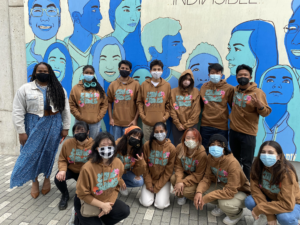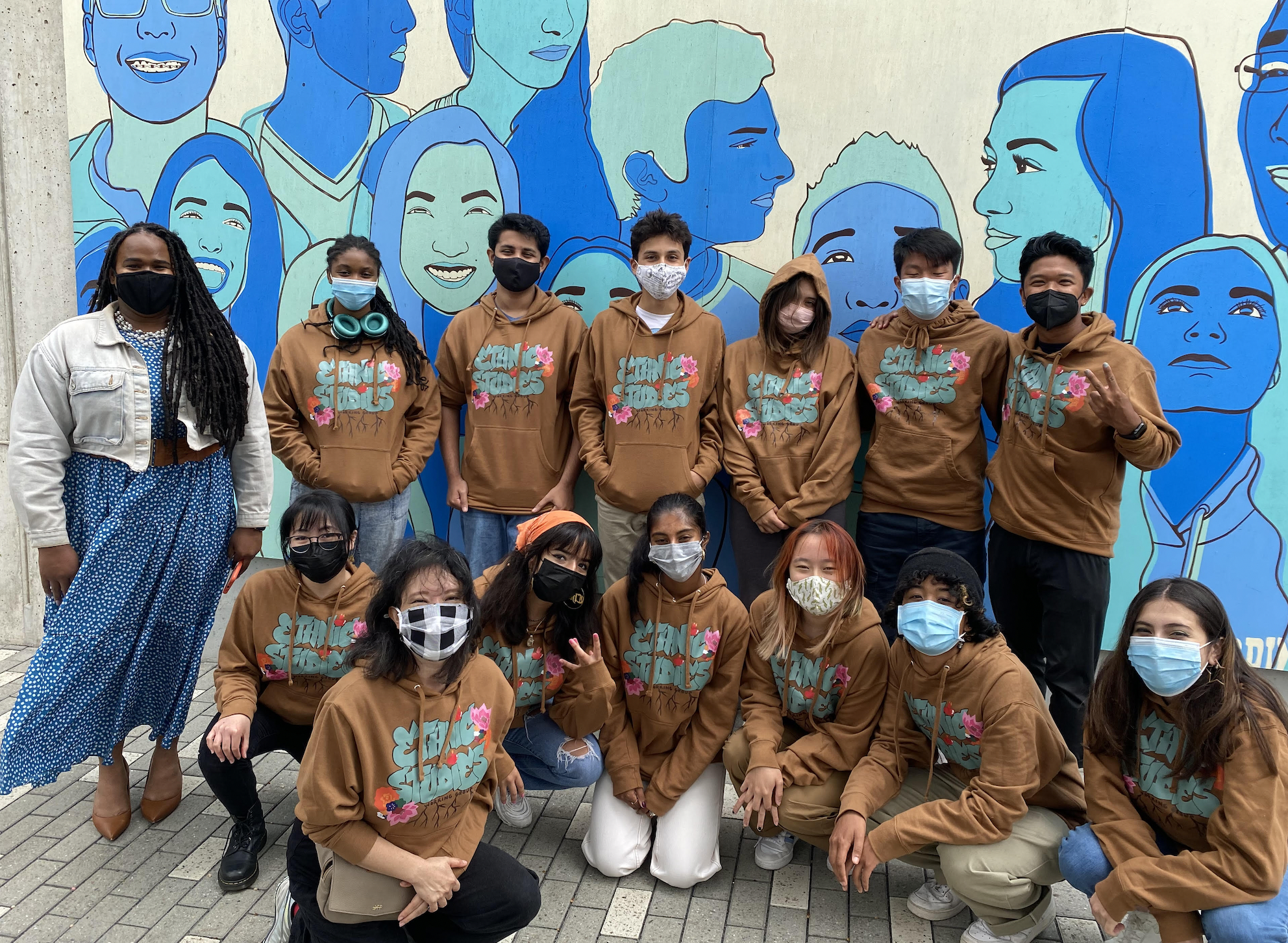The Ethnic Studies Working Group (ESWG), part of the broader ethnic studies initiative at Lick-Wilmerding, has expanded this year to include 11 students and four faculty members. These community members are united to help build our school’s proposed ethnic studies curriculum, focusing on the interests and experiences of students of color.
After years of researching, labor, meetings, obstacles and education, these committed members have shown that advocacy works. An ethnic studies elective will be available at LWHS in the spring of 2023 open to all those who want to take it including sophmores, juniors and seniors. The elective will feature curricula written, researched and made possible by student members, overseen by advisors.

photo courtesy of Naomi Fierro Peña
The efforts to establish a curriculum (separate from the existing senior English seminar) began in late 2019 when a group of anonymous students of color put up a poster in front of Head of School Eric Temple’s office. The poster detailed their personal experiences with racism at LWHS. It included notes about the administration’s response — or lack of response — to these incidents, and the school’s culture faced by students of color.
Posted alongside was a letter with a list of demands. One of these demands was the implementation of ethnic studies. “The students who posted their letter demanded an ethnic studies class and that there be full transparency surrounding racism in the school,” said Naomi Fierro Peña, Director of Student Inclusion and an ESWG advisor.
The students also demanded access to the poster for all, eTiger translations into multiple languages, defined response protocol about hate speech, peer mediators trained on race-based aggression and removing the responsibility from BIPOC students and teachers of proving racism at LWHS. Demanded also was that the admin provides regular updates on how these demands are being addressed. The list of demands, “was born out of a need to support students of color at LWHS,” said Franny Nakada ’22.
ESWG member, Senai Wilks ’24 said, “I see the need because as a community, we need to set a basic understanding. We talk a big talk of calling people out and DEI (Diversity, Equity, and Inclusion), but when these instances happen, people get over it so quickly. I experienced harm from that. That kind of culture is perpetuated a lot at LWHS — we do something once and we’re done.”
Then, the list of demands was presented to the admin, including Temple and Randy Barnett, Assistant Head of School and Dean of Academics. They provided feedback, which included questions about whether ethnic studies already exist at LWHS, the group’s demographics, execution plans, graduation requirements, financial costs and its purpose, among other points.
Unfortunately, “During one of the open houses, the poster and letter were taken down. Removing the poster was seen by the students organizing the protest as an attempt to hide the truth and fueled a lot of our student organizers,” said Peña.
This response to the poster by the administration was what spurred the creation of the ESWG in 2020.
The group initially consisted of leaders from affinity groups, specifically Kababayan Club (KABA), the Black Student Union (BSU) and AAPI students in alliance (ASIA).
Ethnic studies is the study of race, ethnicity and histories often ignored by modern curriculums. Dr. Catherine Fung, who currently teaches English 4 Honors ethnic studies Seminar (available to students since 2017) among other English classes has been an active ESWG consultant.
“My class is based on accumulating a lens of looking at the fabric of American life through a lens of focusing on experiences of people of color, indigeneity, self-liberation and decolonization,” she explained.
Dee Johnson, Dean of Adult Equity and Inclusion spoke to decolonization and the self-liberatory aspects of Ethnic Studies, particularly for BIPOC students. She said, “Decolonization is the process through which we facilitate a remembering of the pre-colonial self — a chance to know who we are and were, where and from whom we came, our individual and collective humanity, and the collective wisdom of our forebears and kin. It is also about celebrating our strengths and cultivating joy despite the evils of racist genocide and displacement. What Ethnic Studies promises is a place for BIPOC folks to author a new chapter for ourselves and our respective communities—in ways that divest from White Supremacy and all other forces that threaten to devalue us, our bodies, and minds. For non-BIPOC folks it is also an opportunity to find themselves on the right side of history and to become future ancestors that their descendants can be proud of. It’s a win-win. That is the liberatory power of Ethnic Studies and the merits of decolonization in a nutshell.”
Ethnic studies curricula can be integrated into a variety of disciplines, and not just taught as a single class in one year. Fung said, “Ethnic studies was originally meant to be across a four-year spread, not as something that students only take in their senior year if they choose to.”
Barnett noted “At this school, we’ve done a lot in terms of anti-racist training and we have the Sam Mihara Day of Justice. But it’s not fully integrated into the curriculum, in terms of requirements.”
Currently, the ESWG is organized into four student-run committees — ethnic studies at our school, Ethnic studies at other schools, surveys, focus groups and partnerships, although they look to update this semester. “Ethnic studies at Our School’ mostly writes curricula, informed by ‘ethnic studies at Other Schools’ which researches curricula at other schools.
Olivia Castillo ’23, Co-Student Inclusion Chair and member of the Surveys and Focus groups committee on the working group explained ongoing efforts. “It’s about collecting a bunch of perspectives so they can be integrated into the curriculum,” she said.
The group’s plan for the 2021-2022 school year included researching in September, presenting to admin in October, planning focus groups and surveys in December and presenting again in 2022.
Presenting means “presenting to the admin, but likely also the student body. The perspective of students is very important.” said Emily Lam ’23, ESWG member.
While the working group is mostly comprised of students, communication with LWHS admin is key to implementing tangible curricula. Student members meet about once a week, while communication is channeled to the administration via adult advisors — Peña, Johnson, Kuya Yanni and Christy Godinez-Jackson. Admin receiving the communications include Temple, Barnett and members of the DEI (Diversity, Equity, and Inclusion) Committee.
Barnett said that for admin, the plans for the ethnic studies curriculum “is more structural than philosophical. At this school, we’ve done a lot in terms of anti-racist training, but it’s not fully integrated into the curriculum, in terms of requirements. I think starting with a pilot program (planned elective) is a good place to start,” said Barnett.
While Barnett endorsed the pilot program set to begin as an elective in Fall 2022, he voiced some concerns pertinent to some community members, “How is the curriculum taught… Are ethnic studies skills everybody can use? What are the ethnic studies skills? The statement of purpose should be clear.”
The purpose of ethnic studies curricula at LWHS was outlined by its catalyst, the poster: to provide resources for BIPOC students at LWHS and demand we address racism within our community. This would certainly pertain to everyone at LWHS. However, a specific class may have more particular objectives.
“Moving beyond historical perspective, ethnic studies is an entire culture; an ethos. The point of ethnic studies is regardless of where you come from, you’re learning about your roots. It poses a way to flip systems of hierarchy and imagine a reality without imposed systems, oppressive hierarchies, and categorizations of people,” explained Peña.
Johnson explained the purposes she sees [in the Ethnic Studies curriculum]: “All the other curricular or pedagogical aspects embedded in our formal education system, particularly in the West or “Global North”, are white-centering. I, therefore, need there to be at least one solid place in the academic experience of BIPOC students where they feel seen, at home, honored, and uplifted; where the content of their academic study is not a deficit narrative or something painfully heavy but rather a moment for joy and healing. Also – we are worth studying outside the White gaze. I am excited to hear about us by us.” she said.
Emulating pushback arguments in the nationwide conversation, Barnett noted, “a message (communicated in these classes) that could be a negative one is that white people are colonizers and racists. Having led multiple conversations in white affinity spaces, white students can feel like they are being blamed for something that happened in the past, that their privilege is bad. To develop the curriculum well, I think there should be extensive interviewing with white students,” he said, emulating pushback arguments gaining traction in the nationwide conversation.
Nakada acknowledged these concerns. “Ethnic studies would be beneficial to both white students and students of color at Lick. I would ask why people assume white people wouldn’t have their own cultures to discuss. Many people we consider white today have histories of discrimination relevant to an ethnic studies class—it’s a generalization to say that white students couldn’t gain a similar experience to that of students of color in these classes,” they said.
The idea of ethnic studies being perceived as attacking white students was a concern of ESWG members. One section of Zine-in-progress designed by ESWG committee members reads: “What IS ethnic studies? 1) An interdisciplinary study 2) Promotes healing, solidarity and liberation, 3) Empowers white students with tools for allyship instead of white guilt and fosters cross-cultural communication. What ethnic studies IS NOT? Just another history class, reverse discrimination, only serving students of color, creating racial divisions and hatred.”
Wilks added her perspective. “We can still talk about BIPOC experiences without demonizing white people; that’s not the point of ethnic studies. White supremacy that has allowed white people to succeed and held BIPOC from being able to — that’s the issue,” she said.
Peña also explained possible underlayers to these sentiments. “The questions of white people being attacked by this curriculum are steeped in white fragility. As an educational institution, if we’re committed to critical learning, people need to look at their own history and confront its realities. In any ethnic studies class I’ve attended, the foundation of that class has been trust. Defensiveness is human, but when we’re able to ask what’s underneath it, then we can overcome it. This is a class that will decentralize whiteness, and its purpose will be a learning community where BIPOC people are the center, and that’s okay,” she said.
Another concern regards demographics. That this initiative, as well as the core ideals of ethnic studies, centers BIPOC, has resulted in some apprehension.
Barnett said, “The planning group made the decision that it’s going to be all students of color on the working group. There’s been a suggestion that only teachers of color teach the class. That’s fine. Also, teachers have the responsibility to make sure all their students feel included and belonging.”
Nakada spoke to why the demographics of the working group is important to them, “We (BIPOC) know our experiences best. We would know what is missing, and what kind of harmful classroom incidents happen. I wouldn’t say that a white perspective isn’t beneficial to us, but what would you even call a white perspective if whiteness isn’t necessarily one general thing? Centering the voices of BIPOC students is important, and having them on the committee is how you do that.”
Pushback to the demographics of the working group isn’t entirely new, either. Naima Liang Blanco-Norberg ’21, an alum who was part of the founding initiative members, spoke on her past experiences. “There was a lot of pushback (from admin) around the group being all BIPOC. Someone from admin voiced that there needed to be white representation in the ESWG. It was like ‘do you understand what we’re doing here?’ There wasn’t really respect for the space for BIPOC individuals who wanted to bring ethnic studies into LWHS,” she said.
Educator demographics have also been contemplated by members of the working group. Peña explained her outlook on the issue. “Ethnic studies center BIPOC, so it would be remiss if we had a white person teaching the history, systems of oppression, and liberation of people of color in an ES class. The ethos of ES is to center BIPOC, so we want BIPOC teachers to be at the center of curating the learning space. When you have a lived experience, that shows in your teaching.”
She also posed possible conflicts with these worries within LWHS. She said, “There’s a class on white consciousness at this school taught by Yeshi Gusfield. And I love that idea; it’s a white person teaching about whiteness. And nobody questions that. Yet, when a teacher of color wants to teach about the histories of people of color, that is somehow contentious. That needs to be examined.”
Johnson added, “If we cannot give BIPOC students an experience solely about them when everything else is about Whiteness, settler colonialism, and apartheid, then I think we would need to really re-assess whether or not we want to be/can be an anti-racist institution.”
Yet another concern could be potential financial costs. “Some concerns are financial — you’d have to hire new teachers and that may have an impact on tuition. Or do you remove some programs, then the concern is which requirements or programs get removed?” said Barnett.
Peña shared their outlook, “When this class is posed as a threat, or as something that could take away (financially), that serves white supremacist narrative. A divide and conquer and scarcity mentality; that there is not enough for everyone and that we need to be pitted against each other. The way I run this group; we are beyond that. There is abundance at this school — it would be silly to think that there is not enough. I think that those narratives are tactics — when people perpetuate them it clearly demonstrates opposition to the implementation of our initiative,” she said.
Prioritization concerns aren’t new either. George Duran, ‘23, ESWG member, and Co-Student Inclusion Chair reflected on prioritization, “We invited Mr. Temple to one of our meetings. One thing mentioned in a list was for him to verbally show support for the initiative in a community meeting. Moving forward, we hope that admin will begin actively publicizing their support of Ethnic Studies to the student body and showing our community that Ethnic Studies is important.” he said.
Castillo, (also co-chair) added, “Throughout the interview process, we have gained so much support from The Board of Trustees, The Parent Association, Students, FacStaff, etc. Regarding action from admin, sometimes Mr. Temple will come and meet with us, and there will be email exchanges, but we would appreciate it if more was taken by their own accord.”
Liang Blanco-Norberg echoed their concerns when looking back on her experience. “The administration not giving us much time was really frustrating,” she said.
Johnson said, “The reality is that there are considerations to be made around staffing, curriculum development, the schedule et cetera but I cannot imagine a well-resourced school like ours, with the commitment to justice like we have, not moving forward with such a mission-aligned course, which Ethnic Studies is. I am excited for the Ethnic Studies course in 2023 and for how it will transform the community.”
They pose an important point — shouldn’t this be a priority for LWHS, a school that claims in its mission statement to “strive to cultivate a diverse, collaborative community of students and adults that is rooted in empathy, equity, respect, humility, and accountability… committed to upholding the tenets of anti-racism”?
Peña said, “We like to pat ourselves on the back because we are a very racially diverse community. People get really excited about the numbers, but once we get folks in the door, how do we make them feel comfortable? Like they’re home, not a guest in someone else’s home? I think it’s emblematic of SF in the very white liberal progressive sentiment — it feels good to say we live in a small diverse ecosystem. But when it comes to actual prioritization in comparison to other things at this school, you realize there isn’t funding, there isn’t faculty and staff resources towards making this initiative happen.”
Alex Pate ’22, ESWG member said, “I think the narrative that LWHS presents is that we are a very diverse community. But I will say in classrooms, at least for me, it doesn’t always feel like that. I’m often the only Black girl in my class, so even if we are discussing topics related to my life or my livelihood, it’s definitely a little isolating. A lot of times it felt like texts were offering white perspectives on BIPOC lives, so the narrative that I often get is we want to represent you, and we want to see you represented, but that doesn’t always match up.”
Progress has been happening though, and the future holds many prospects for the ESWG.
“The spring of 2023 will be the first time ethnic studies will exist as a class unattached to departmental guidelines. I want to shout out Christy Godinez-Jackson. Without her commitment and getting really creative, we wouldn’t be able to have this,” said Peña.
In reflection, Johnson said, “It is sad that folks are called to devalue themselves simply because we’ve been fed one dominant narrative of White Supremacy. That is the freeing aspect of ethnic studies; not only do you get to imagine yourself without all the trappings that other people and systems have put on you — the hate we’ve inherited — but you also get to sort through and make an informed decision about whether or not the inherited opinions of others resonate, matter, or ring true for you.”
The proposed ethnic studies elective will be available for sophomores through seniors, scheduled to begin in spring 2023. No prerequisites are necessary.







